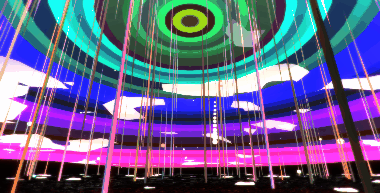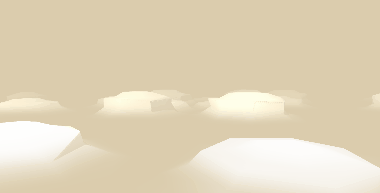Trending
Opinion: How will Project 2025 impact game developers?
The Heritage Foundation's manifesto for the possible next administration could do great harm to many, including large portions of the game development community.
You don't simply play this game--you orchestrate an audiovisual performance. The soundscapes and landscapes can be manipulated using a standard joypad, a keyboard and mouse, or a MIDI controller.

This interview is part of our Road to the IGF series. You can find the rest by clicking here.
Panoramical is...unique. This collaboration between DJ and programmer Fernando Ramallo and Proteus co-creator David Kanaga is an interactive experience that lets players manipulate the look, sound, and feel of a dozen abstract landscapes. It features musical collaborations with luminaries like Baiyon (Pixeljunk Eden), doseone (Samurai Gunn), Richard Flanagan (FRACT), and Jukio Kallio (Nuclear Throne).
You don't simply play this game--you orchestrate an audiovisual performance. The soundscapes and landscapes can be manipulated using a standard joypad, a keyboard and mouse, or a MIDI controller. A pro licensed version is available for DJs and VJs who want to incorporate it into their artowrks and live shows.
Panoramical has been nominated for IGF awards in the categories of Excellence in Visual Art, Excellence in Audio, and the Nuovo Award. It also received honorable mention in the Seumas McNally Grand Prize category.
Fernando Ramallo and David Kanaga answered some questions about the game for Gamasutra.
Fernando: I have a background in digital animation, video, sound and graphic design so that was a good skillset for an independent developer. I only started making games in my early 20s, though. I worked at a studio for a few years before going solo in 2010, trying to make brainy, pretty abstract puzzle games, eventually moving on to focusing on interesting immersive experiences.
David: Prior to Panoramical, I worked on a number of other musical games including Proteus, Dyad, and Ada.

Fernando: Unity 4, Photoshop, Git, lots of notebooks of different sizes
David: Ableton, MIDI keyboard, MIDI knobs, Unity
Fernando: Panoramical was my main focus for a whole three years. I did a thing or two in between, though, so it must’ve been around two years of full time work.
David: Same, though part time for me. The project took long, it framed a whole period of life growth death/rebirth, snake-skin shedding.

Fernando: It came up when I stayed at David’s after GDC one year and he had a Korg Nanokontrol fader controller lying around. We started making a few prototypes for it where David would make the audio react to it in Ableton and I would make a little thing in Unity that used it as a controller. Then we ran them side by side so it had sort of fake reactive audio. One of the prototypes was about orbiting a planet and every slider changed the scale of things in the planet, the color of the sky, etc. It felt really good to have these broad changes in the visuals and audio at the same time.

David: I'll just add that when I first used Ableton, about eight years ago, I'd never used music software that was so easy, such transparent affordances, dead easy to map parameters to MIDI (I started w/fruityloops, which is easier for step-sequenced beats, but Ableton is easier for the whole process). I was becoming deeply interested in games at this time, and for a while I considered Ableton no doubt the best game I'd played. I sometimes made little Ableton sets that were meant to be played by non-musicians just twiddling knobs on a MIDI controller. So I was beyond stoked when we started this process that allowed this mode of working to mix with Fernando's swoony visual flux.
Fernando: Oh boy. I was blown away by the way some people have been using it. Someone projected it on a shipping container, our collaborator Richard Flanagan hooked it up to a modular synth and someone made a controller in the shape of a badger where you rub its belly with its hand to control the game. Amazing!
Fernando: So the behaviors behind what’s being controlled are pretty simple and the amount of possibilities aren’t that big. Everything is very modular and the controls are independent from each other. But when you put it all together it feels complex, as if there were an infinite amount of possible combinations. The biggest challenge was to make all those combinations feel interesting. Putting a basic scene together wouldn't take that long but it’d take a very big effort tweaking everything so that every combination was relatively curated. That and finding new things to change across a lot of different scenes across 18 different controls was very time consuming. What I also found is that it was preferable to let some controls produce a result that didn’t look right for the sake of increasing the range of possibilities, players would then find their own version of what *feels right*.

Fernando: It’s so universal, really. A lot of people engage with experiences like these because everyone appreciates beauty. They might not be able to name why, since we don’t have the vocabulary to talk about those feelings, but they’re there. That’s what makes it so hard to sell these experiences as products, too. It’s also relatively easy to find interesting moments while making these, abstract computer graphics have their own aesthetic that’s absolutely untapped.
David: I think this digs down to the proper 'grain' of the computer game medium as a material. Andi McClure and Michael Brough's Become a Great Artist rubs this grain so well, too. I remember Michael has spoken about games as 'alien consciousnesses,' and I think that gets to the heart of this. The game is a little alien animal, and it has sense organs (we call them inputs), and it has bodily-gestures/facial expressions and sings (we call them outputs), and we are its external world. 'Games' in the game theorist's sense, as things which have goals, etc.-- these are not only about the material of the game itself, but also about treating the player's consciousness as a material. This standard game form mixes some sort of rational human consciousness with the alien consciousness, and in many cases gets much too rationalistic to me. Well, I am interested in dissolving into that alien as much as possible, and letting the rational stand back for a bit. I love the raw material, so I love these kinds of games that listen closely and embrace the player's input wholeheartedly while at the same time remaining completely disinterested in what exactly the player chooses to do, accepting/ 'loving' (if software can be said to do that in a way) it all, unconditionally.
Fernando: GNOG! It’s so magic! orchids to dusk was lovely. I enjoyed Her Story, too.
David: I haven't played a whole lot of them yet, but I really love the desktop worlds of Cibele, that's a very exciting form to me, to recontextualize familiar forms of utilitarian software as standalone worlds. I hope there's a lot more of this coming. I think that games are little Operating Systems (OSs are big games), and that's the solution to computer game formalism chatter, and Cibele argued/resonated with that point beautifully in my experience of it. Beginner's Guide was great, too, also had a strong rhetorical angle… Soft Body, I haven't played that one yet, but I can kind of feel with my eyes watching the video a lot of what I imagine the resistance feels like, and I already love it, too. Looking forward to playing more of the bunch!
Don't forget check out the rest of our Road to the IGF series right here.
You May Also Like